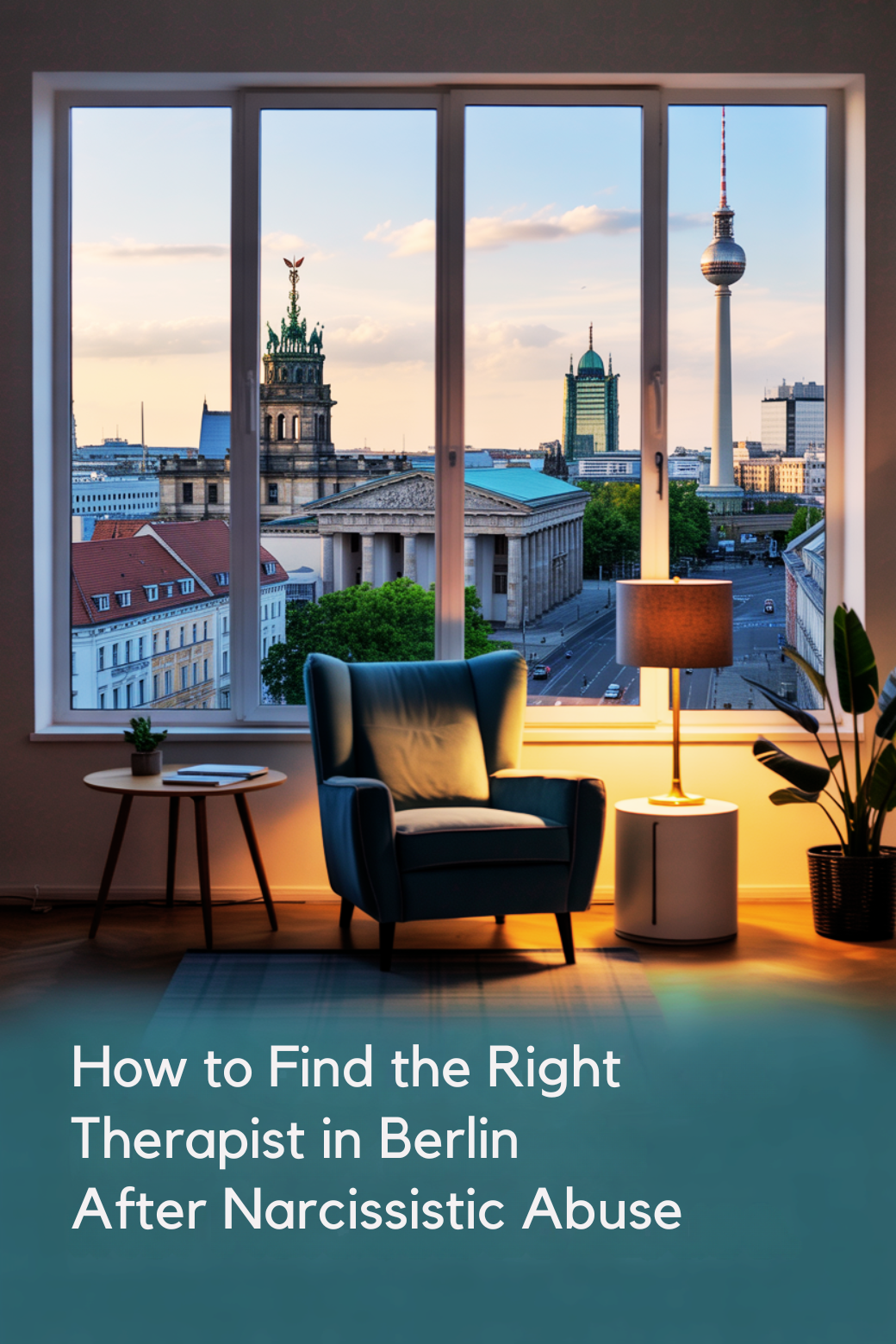Now Reading: How to Find the Right Therapist in Berlin After Narcissistic Abuse
- 01
How to Find the Right Therapist in Berlin After Narcissistic Abuse

How to Find the Right Therapist in Berlin After Narcissistic Abuse
🇩🇪 How to Find the Right Therapist in Berlin After Narcissistic Abuse
10 Questions That Can Save You Years of Setbacks
Healing from narcissistic abuse in Berlin? You’re not alone—but the mental health system here, while advanced, can be a maze if you’re a survivor of psychological warfare, emotional coercion, or complex trauma.
This guide is for anyone in Berlin—whether you’re a local, expat, or international student—who’s looking for a therapist who gets it. Not just someone to “listen,” but someone who knows narcissistic abuse is real, devastating, and recoverable.
🛑 Warning: Not Every Therapist in Berlin Will Understand You
Germany has a world-class therapy infrastructure. But:
- Many therapists rely on traditional models that minimize narcissistic abuse
- Insurance-covered therapy often means long waits, limited options
- Some are dismissive of gaslighting, trauma bonding, or CPTSD unless framed clinically
🧠 You Need a Therapist Who:
✔️ Knows narcissism is more than arrogance
✔️ Understands emotional abuse is abuse
✔️ Uses real trauma tools, not surface advice
✔️ Can work in English or with cultural nuance
✔️ Prioritizes trust, not blame
🧩 Ask These 10 Questions Before You Settle Into Therapy
Ask during your consultation—yes, even in Germany. It’s not rude. It’s wise.
- Have you supported clients recovering from narcissistic abuse or coercive control? You want real-world experience—not just “toxic relationships.”
- How do you help someone rebuild their identity after long-term gaslighting? They should mention parts work, narrative repair, or self-trust recovery—not “positive thinking.”
- What trauma-informed methods do you use? EMDR, IFS, body-based therapies, or Schema Therapy = strong yes. If they say “I mostly talk,” keep looking.
- Can you help me name manipulative dynamics if I’m unsure what happened? Therapists shouldn’t pressure you to label anything—but they should help decode it.
- How do you work with people who’ve lost their ability to set boundaries? Look for nervous system awareness, boundary coaching, and safety-building.
- What would you say if I told you I feel ashamed for not leaving sooner? Compassion. Always. If they get clinical or dismissive—run.
- I struggle with trust and also fear abandonment. How would you support that? A good therapist helps rebuild secure attachment, not shame you for either side.
- If I disagree with something in therapy, how do you handle that? They should be collaborative, not defensive.
- Do you offer long-term support, or only short-term structured programs? Many Berlin-based therapists are short-term by insurance default. Ask.
- What kind of support do you offer between sessions? If it’s “nothing,” consider another option. Journaling, practices, email recaps = 💯
🏥 Mental Health Options in Berlin
🇩🇪 Publicly Covered Therapy (via Krankenkasse)
Pros:
- Free or low-cost if insured
- Some English-speaking therapists participate
- Includes psychotherapy, CBT, some trauma care
Cons:
- Waitlists are brutal (6–12 months)
- Limited trauma specialists
- Most therapists trained in traditional talk therapy (Gesprächstherapie)
How to Access:
- Ask your GP for a referral (Hausarzt)
- Or search via psych-info.de
- Or call your Krankenkasse and ask for therapists with English fluency
💼 Private & Specialized Trauma Therapists (English-Friendly)
These therapists do not require insurance pre-approval and often offer quicker start times.
1.
Berlin Therapy (Prenzlauer Berg)
- Trauma-focused, EMDR, parts work
- English-speaking, international team
- berlintherapy.de
2.
Private Practice: Miriam J. Rose (Trauma & Identity Healing)
- Specializes in narcissistic abuse, survivors of toxic family systems
- Offers sessions in English or German
- EMDR certified
3.
The Berlin Practice
- Psychologists trained in CPTSD, chronic shame, and interpersonal trauma
- Offers both private pay and invoice for reimbursement
- theberlinpractice.com
4.
MindSpace Berlin
- Group and individual therapy
- Focus on emotional regulation, boundaries, and trauma bonding recovery
- Highly rated by international clients
🌐 Online Therapy Platforms Available in Germany
- BetterHelp – Global therapists with experience in narcissistic abuse
- TherapistsinGermany.com – Filters for language, approach, insurance
- Talkspace Europe – Increasing EU availability
- Mental Health Europe – Local directories for trauma-informed care
📌 Final Thoughts for Berlin-Based Survivors
Yes, Germany’s therapy system can be frustrating.
Yes, some providers are cold, clinical, or untrained in covert abuse.
And yes—your healing is still possible.
You don’t need a therapist who fixes you.
You need one who believes you, sees you, and walks beside you.
Your trauma is real.
Your confusion is valid.
Your recovery deserves better than guesswork.















